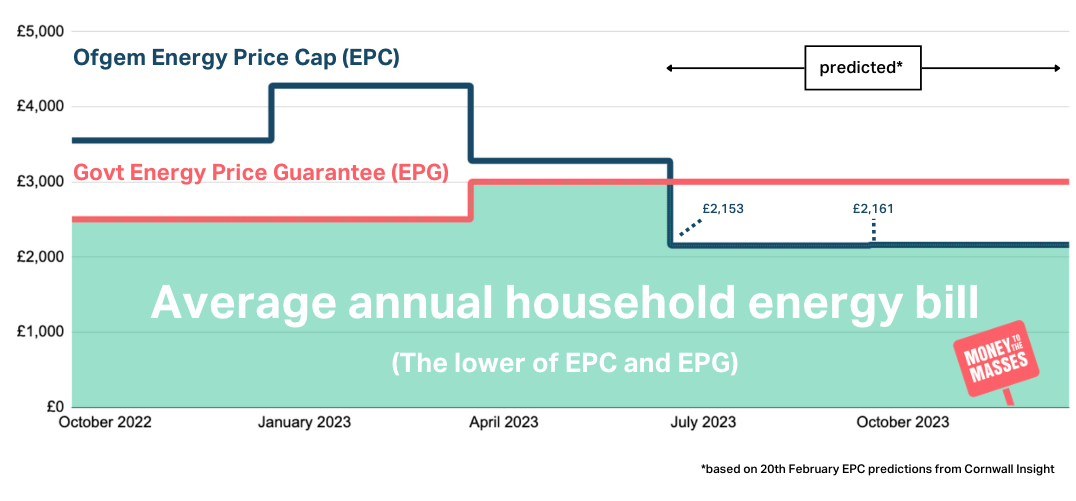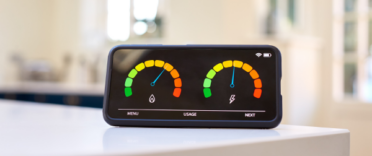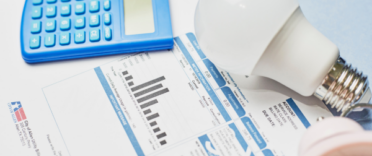
On 27th February 2023, Ofgem announced that the energy price cap will reduce by almost £1,000 from £4,279 to £3,280 for a dual fuel household. The drop in the energy price cap is a reflection of the fall in energy wholesale prices in recent months. Despite the energy price cap drop, most consumers will not see a reduction in household bills as the government's Energy Price Guarantee (EPG) is set to increase from £2,500 to £3,000 in April 2023.
Ofgem CEO Jonathan Brearley said:
"Although wholesale prices have fallen, the price cap has not yet fallen below the planned level of the Energy Price Guarantee. This means, that on current policy, bills will rise again in April. I know that, for many households this news will be deeply concerning."
"Where people are struggling, we urge them to contact their supplier to make sure they are getting all the help and support they are entitled to. We also think that, with bills continuing to be so high, there is a case for examining with urgency the feasibility of a social tariff for customers in the most vulnerable situations."
In this article, we explain the difference between the energy price cap and the Energy Price Guarantee as well as how the changes announced by Ofgem will affect your energy bills.
What is the energy price cap?
The energy price cap is set by the energy regulator Ofgem. Ofgem takes into consideration wholesale energy prices and sets a maximum amount that energy suppliers can charge consumers for their gas and electricity. Despite the energy regulator setting maximum charges, the cost of your energy bills is based on how much energy you use. The more energy you use, the higher your energy bills will be.
What is the Energy Price Guarantee?
The Energy Price Guarantee (EPG) was introduced by the government in October 2022 to help consumers manage the cost of rising energy bills. The EPG figures are based on dual fuel customers that pay via direct debit and are what the average domestic household can expect to spend on their annual energy bill.
The Energy Price Guarantee is currently set at £2,500 but is due to increase to £3,000 from April 2023 and remain as such until March 2024. At present, the gas and electricity unit rates are capped at 10.3p per unit of gas and 34p per unit of electricity but it is not yet known what these rates will be when the EPG increases in April.
Remember, exactly how much you will pay for your energy bills will vary depending on how much energy you use.
What does the energy price cap reduction mean for your energy bills?
Despite Ofgem announcing its energy price cap reduction it will not affect how much you pay for your energy bills. This is because the amount that you pay is currently determined by the government's Energy Price Guarantee which is set at £2,500 but is due to increase to £3,000 in April 2023.
However, from the summer, analysts such as Cornwall Insight have predicted that Ofgem's energy price cap is likely to reduce which will mean that consumers may see a reduction in energy bills even if the government's EPG stays the same. This is because the unit energy prices that consumers pay are capped by the lower rate between the Ofgem energy price cap and the government's Energy Price Guarantee.
The below graphic highlights what the average dual fuel household can expect to pay for their energy bill in 2023, which is the lower rate between the Energy Price Cap (EPC) and the Energy Price Guarantee (EPG) as shown by the green area in the graph. Remember, however, that prices are capped on unit rates for gas and electricity and you can therefore pay more or less depending on how much energy you use.
Average annual household energy bill 2023
What to do if you are struggling to afford your energy bills
If you are struggling to pay your energy bills each month there are a number of things that you can do to try and ease the burden. We list some ways below but additional money-saving tips can be found in our article, 'How to save money on your energy bills'.
- Contact your energy supplier - notifying your energy supplier that you are facing financial difficulty can help you to arrange an affordable repayment plan.
- Use less energy - consciously using less energy can mean you spend less on your energy bills. You may also be able to benefit from the Demand Flexibility Service where you can get paid for using less energy at set times.
- Switch to LED bulbs - LED lightbulbs are more energy efficient and can therefore save you money when lighting your home.
- Turn down your thermostat - according to British Gas, turning your thermostat down by 1°C can save up to £115 in energy a year.
- Use energy-efficient appliances - choosing appliances with a higher energy efficiency rating can help you to save money as they are cheaper to run than less efficient appliances.
- Get free debt advice - you can seek help from a number of debt websites and charities
There are also a number of grants and schemes available for those who are most vulnerable. More information and help on the cost of living can be found in our Cost of Living guide.






